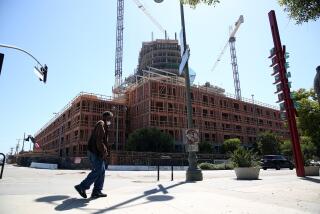Gordon Brush plant owner bristles at red tape tying up expansion
Ken Rakusin is frustrated.
You would be too.
Since 2009, the owner of Gordon Brush Manufacturing Co. has been trying to expand his 51,000-square-foot City of Commerce factory by 20,000 square feet. That would mean a larger factory floor, more office space for the engineers who work with customers to design new products, conference rooms, a spacious cafeteria.
It would mean room to expand beyond Rakusin’s current workforce of 85. More sales. Higher payroll. More property tax, sales tax, income tax. A $1.5-million investment in construction alone.
Four years on, and he’s still trying. “I’ve almost given up,” Rakusin, 61, told me one day recently as we toured the plant. “For the life of me, I can’t understand it. If I rented out the building and moved to Nevada, they’d welcome me there with open arms.”
The glitch apparently has something to do with a provision of the Los Angeles County building and fire code that would be affronted by Rakusin’s construction plan. Before we get to the details, let’s recognize that his experience underscores a major flaw in California’s business development program, such as it is. Call it the missing middle: No one has the responsibility to mediate among various code and regulatory agencies in cases where it might make sense to work around the rules in a rule book to enable a California manufacturer to remain in place and even expand.
In the case of Gordon Brush, the City of Commerce and the Los Angeles County Economic Development Corp. have each taken a crack at finding a way around the fire code. “I’ve asked every question possible, and the answers come back every time: ‘Nope,’” Rakusin says.
He echoes other small-business owners in observing that California isn’t even organized to clue them in on the pro-business programs it does offer. Rakusin recalls that at an industry conference during the depths of the 2008 recession, a brush maker from Missouri told him about that state’s innovative “workshare” program, through which the state paid some of the wages of skilled workers to tide companies over the slump and keep layoffs to a minimum.
Rakusin wondered if California had a similar program, only to discover that it did — and had pioneered the concept! “But nobody knew about it here,” he says. “How come I had to learn about it from someone from Missouri?” (The California program helped Rakusin keep some workers through the most recent recession that the company could not afford to lose for the long term.)
What’s at risk is a distinguished Southern California business with a veteran force of skilled workers earning as much as $20 an hour, plus medical benefits and a 401(k) plan. Gordon Brush was founded in 1951 in Los Angeles and acquired in 1974 by William Loitz, a McDonnell Douglas engineer who had helped put a man on the moon and figured that was capstone enough to anyone’s aerospace career, as Rakusin recalls.
By 1989 the business was in trouble. Rakusin was an executive at Xerox in El Segundo looking for a new challenge, but when he first met with Loitz he was doubtful. “I think you’ll be able to fix this,” Loitz told him. Rakusin thought at first, “I belong at Xerox,” then decided he’d be a fool to turn down the gamble of a new career. In a year he had doubled Gordon’s profit and by 2010 he had bought out the last of the Loitz family’s interest. The company moved to its Commerce location in 1998.
You may think the brush business is simple and low-tech, but that’s not true even if all you know about it is paintbrushes. There are cheap paintbrushes and expensive ones, brushes for house painters and portrait artists, all requiring different shapes, sizes and bristles. There are cheap cosmetic brushes made from white goat hair and artist’s brushes made from blue squirrel fur, which costs $5,000 a pound.
“We’ve sent brushes to the moon and Mars,” Rakusin told me, describing a contract from the Jet Propulsion Laboratory to equip the Mars and lunar rovers with stainless steel brushes for sweeping clean their collection scoops. “A guy came over from JPL and said, ‘We need three — one to go up and two for testing.’” His finished products were nestled like precious jewels or sensitive explosives in a suitcase with foam padding so they wouldn’t be jostled on their way to La Cañada Flintridge.
The factory floor is studded with huge half-million-dollar, computer-driven machines from Germany, Italy and Belgium. But despite what you may have heard, robots aren’t perfect. Often there’s no substitute for a human eye and hand to put the finishing touches on a product or to fix a flaw.
The bestselling brush Gordon makes is a hand-held, all-purpose one made of wood veneer, which the factory can turn out at the rate of 30,000 a day. It uses robot machines to drill holes in the 8-inch handles and fill them with tufts of wire, watched over by a single operator per shift. (“This is how I compete with China,” Rakusin says.)
At the other end of the scale are custom and one-off items that Gordon Brush makes for NASA, for the semiconductor industry, for the Pentagon — you’d be amazed at who needs a brush with a unique design. For example, the Army: As Rakusin tells the story, it was discarding the gun barrels of its Abrams tank after their bores got too encrusted with soot.
“They were throwing them away at $150,000 each, until somebody said, ‘Can’t we clean them instead?’” The Pentagon had three teams of engineers working with three brush companies to come up with a solution. Gordon won the contract with a bulbous design made of heavy plastic with ranks of short wire bristles — $150 each to save gun barrels worth a thousand times as much.
Rakusin’s decision to expand the plant in 2009 came as the economic recovery got underway. His idea was to add a two-story annex on one side of the factory, with room for an expanded employee cafeteria and more office space. That would free up as much as 20,000 square feet for manufacturing. He would also push his loading docks out into his parking lot for an additional 4,500 square feet of warehouse.
In the beginning, things moved fast. The Commerce planning commission gave zoning approval in January 2011, the county fire department asked for some minor changes in February, then electrical approvals followed, as well as assents from Southern California Edison and the railroads whose infrastructure abuts the property.
Then, in May 2011, the county fire marshals objected that the proposed expansion violated fire code provisions governing the size of a building relative to its lot.
And that was that.
“You’re dealing with absolutes,” says Alex Hamilton, the City of Commerce’s top business development official. “It’s a building and fire code issue.”
He says the project sailed through the city’s planning process — “from a zoning perspective it looked fine” — but the fire code was out of the city’s jurisdiction. Hamilton says fire officials tried to find a way around the code restrictions but couldn’t. “This received attention at the highest levels,” he says. (Fire Department officials didn’t return my calls.)
The L.A. County Economic Development Corp. ran into the same roadblock, says Barbara Levine, the LAEDC’s regional officer for the City of Commerce. Rakusin “was talking to the right people,” she says. He just wasn’t getting the right answers.
It’s conceivable that the fire code provision at issue in Rakusin’s expansion has such important safety implications that what it says goes. But it’s also possible that the problem is that every agency sees his issue from within its own sandbox, because no one in state or local government is entrusted with the power to bring them together and make a beach.
Rakusin says he receives “one letter a week” from economic development agencies in other states. They don’t tell him anything he doesn’t already know. He owns a factory in Wisconsin, where the purchase of factory equipment is exempt from sales tax; in Commerce, a $1-million machine will cost him an extra $90,000 in state and local levies.
Throughout his ordeal, Rakusin got the strong impression that things might have gone a little better if he was seriously threatening to leave the state. That’s a dangerous impression to give a business owner, especially a manufacturer already sensitive about being ignored.
“Manufacturing gets no attention, but it’s the most consistent job creator there is,” he says, “and this is already the most expensive place to do it.” Are these the businesses California should be taking for granted?
Michael Hiltzik’s column appears Sundays and Wednesdays. Reach him at mhiltzik@latimes.com, read past columns at latimes.com/hiltzik, check out facebook.com/hiltzik and follow @latimeshiltzik on Twitter.







